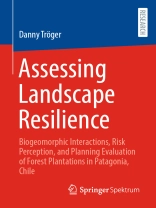This book examines the extent to which exotic pine plantations are a suitable strategy for maintaining the essential functions, structures, processes and identity of the Patagonian landscape over time. To this end, it integrates three empirical studies with inter- and transdisciplinary approaches under the theoretical framework of landscape resilience.
The first study analyses the biogeomorphic interactions of different land uses and their relevance for soil conservation and landslide mitigation. The second study examines perceptions of natural hazards and focuses on networks of human and non-human actors that maintain landscape resilience. The results of these two studies are incorporated into the planning evaluation of land zoning and alternative strategies are developed, inspired by normative polycentric governance.
It is concluded that Pinus plantations partially fulfil their ecological objectives of erosion control and landslide mitigation. However, their performance lags behind that of secondary forests with native species and they create new risks such as reduced biodiversity, increased risk of wildfires and conflicts with local identity. The book concludes with new research questions of trans-regional importance.
Table of Content
Landscape Resilience at Risk – Forest Plantations as an Answer?.- Pinus Plantations Impact Hillslope Stability and Decrease Landscape Resilience by Changing Biogeomorphic Feedbacks in Chile.- “Industry Impacts More Than Nature”: Risk Perception of Natural Hazards in More-than-human Worlds.- Navigating a Trojan Horse in the Last of the Wild: Pine Trees, Agroforestry, and Land Zoning Assemble the Landscape Resilience Dilemma in Patagonia.- What Can We Learn from Aysén? – Discussion and Derivation of Follow-up Research Questions.
About the author
Danny Tröger conducts research on human-environment interactions at the Kassel Institute for Sustainability. He focuses on the risks of land-use change, drawing on methodologies from geoecology, remote sensing, ethnology and spatial planning.












